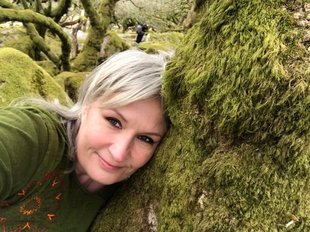Diane Evans-Wood: "Once you accept your new kind of normal, life can resume and you can still have fun."

Diane
Diane Evans-Wood was working as a Palliative Care Nurse Specialist when she was diagnosed with ovarian cancer in 2013. She shares her story — from the early symptoms through to diagnosis and treatment.
"In early 2013, I met my partner and now husband. We had an absolute blast that summer with music concerts, festivals, visiting places of interest and exploring the land around Glastonbury where I lived.
A few weeks before Christmas that same year, I woke with sudden pain in my lower back and bladder area. It kept me awake most of the night but then subsided with no obvious explanation as to what had caused it. Being a nurse, I wouldn’t normally see my GP unless I absolutely had to but this pain bothered me due to the intensity and I just felt something was not right.
I went to see my GP that same week and although she tried to reassure me with reasonable explanations such as constipation, trapped wind, menstrual cycle issues due to menopause, I still felt that the possibilities that she put forward did not justify the intensity of pain I’d experienced. I had suffered for many years with constipation but it was more troublesome of late and I had also felt more bloated than usual. I’d noticed that I felt more tired come the winter months but this was hardly surprising given my job as a Community Palliative Care Nurse Specialist, which was extremely busy in addition to the wonderful year I’d had.
My GP arranged for an ultrasound scan which showed up a small cyst on my ovary. My CA125 was also quite raised.
Diane Evans-WoodsBeing a nurse, I wouldn’t normally see my GP unless I absolutely had to but this pain bothered me due to the intensity and I just felt something was not right.
I was fast tracked to the Gynae team and the consultant categorically stressed to me that he thought this was a small haemorrhagic cyst and not to worry, but given my concern he agreed to remove it. Following this, he came to the ward to tell me I had ovarian cancer. My poor Mum was devastated but the news didn’t come as a surprise to me really.
As my sister drove us all home I remember how blue the skies were and the sunshine was so beautiful, “What a lovely day to be told I’ve got cancer” I said, and we hardly stopped laughing at that all the way home. Life had changed for me and my loved ones in a split second and yet life remained so normal still. It all felt surreal!
I had a laparoscopic hysterectomy to remove my ovaries and omentum. However, the results were not as expected. My diagnosis changed and I was told I had borderline ovarian tumours and wouldn’t need chemo. Suddenly everyone around me seemed to be relieved and grateful that this was not as serious as first thought. This was not how I felt though. I had so many reassurances regarding my symptoms, and then the confusion around my diagnosis, plus being thrown into surgical menopause with all its challenges, left me feeling pretty low during this period.
A year later at a routine follow up I explained that I was experiencing bloating and constipation again and felt very tired. My gynae-oncologist was not concerned, but I was later diagnosed with low-grade serous ovarian cancer. I would advocate all women to trust their instinct and if they sense something is not right please make sure you express this to your doctor.
I started six cycles of carboplatin and paclitaxel chemotherapy and on New Year’s Eve my hair was starting to noticeably fall out. My partner cut my beautiful dreadlocks off for me and shaved my head. He also shaved his hair off to support me and help me to cope with losing my hair. I became so ill, anaemic and neutropenic so the paclitaxel was stopped and I continued with carboplatin.
In 2016, I had to make the heart-breaking decision to retire through ill health from a 34-year nursing career. It’s not just cancer that we have to cope with but a whole host of other life-changing challenges and events in the aftermath. Unfortunately, I developed breast cancer in January 2018 and underwent surgery and radiotherapy to remove the disease, followed by genetic testing which revealed I am BRCA negative.
I am currently living with advanced metastatic ovarian cancer whereby the disease has spread into my chest. I am receiving fantastic support from my family and friends but also from my local hospice, my oncologist and the gynae-oncology nurse specialist. I am now the palliative patient that I cared for and supported for all those years. Soon I am embarking on another course of chemotherapy with a view to trying therapies such as Avastin or a PARP inhibitor to stabilise the disease.
This is my story and although the disease seems to have been relentless, I have never given up hope. You can live life with cancer. Once you accept your new kind of normal, life can resume and you can still have fun."